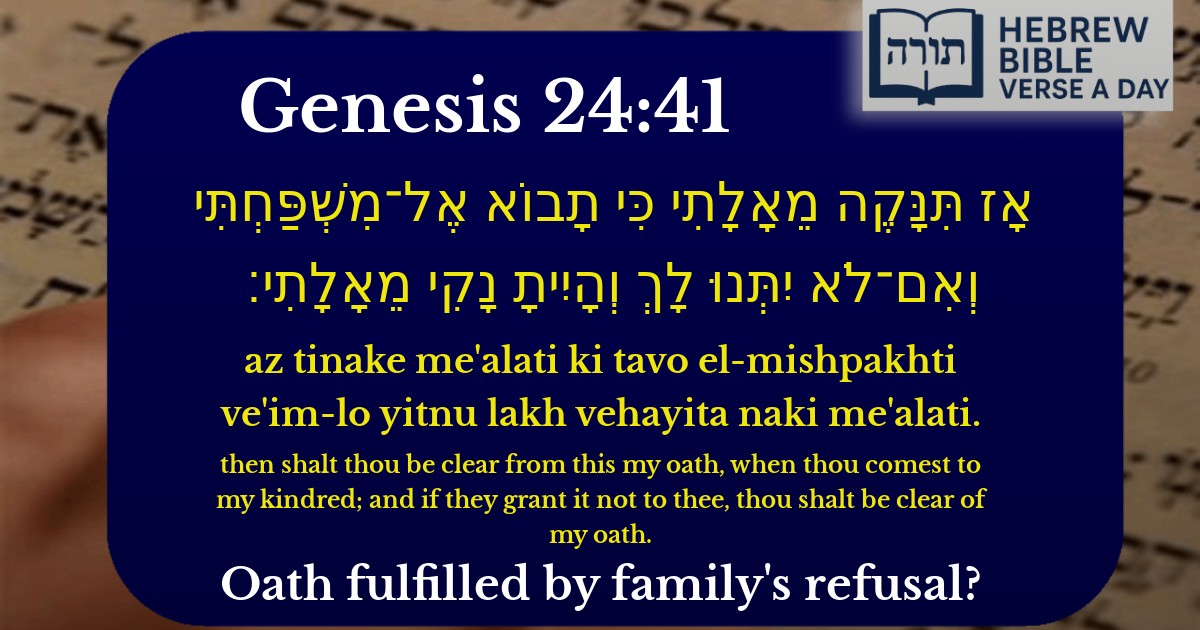Frequently Asked Questions
Q: What does Genesis 24:41 mean?
A: Genesis 24:41 is part of Abraham's instructions to his servant Eliezer when sending him to find a wife for Isaac. Abraham assures Eliezer that if the family of the potential bride refuses the marriage proposal, Eliezer will be released from his oath to find a wife from Abraham's relatives. This shows Abraham's fairness and understanding that not everything is within human control.
Q: Why is this verse important in the Torah?
A: This verse is important because it demonstrates the concept of תנאי (tenai), or conditional agreements, in Jewish law. Abraham sets clear conditions for Eliezer's oath, teaching that oaths can have limitations. The Talmud (Kiddushin 61a) discusses similar conditional agreements, showing how this principle applies in halacha (Jewish law).
Q: What can we learn from Abraham's words in this verse?
A: We learn from Abraham that when making commitments or oaths, one should consider realistic conditions and exceptions. Rashi explains that Abraham wanted to ensure Eliezer wouldn't be bound by the oath if the mission proved impossible. This teaches us to be thoughtful and practical when making promises.
Q: How does this verse apply to everyday life?
A: This verse teaches us to set reasonable boundaries in our commitments. Just as Abraham recognized that Eliezer shouldn't be bound by an unfulfillable oath, we should also be mindful of making realistic promises and allowing for exceptions when circumstances are beyond our control, a principle emphasized in Jewish ethical teachings.
Q: What does 'being clear from the oath' mean in Jewish tradition?
A: In Jewish tradition, 'being clear from the oath' (נָקִי מֵאָלָתִי) means being released from the obligation of the oath due to specified conditions not being met. The Rambam (Hilchot Shvuot 6:1) discusses how oaths can become null under certain circumstances, similar to Abraham's conditional release of Eliezer in this verse.


Context of the Verse
This verse (Bereshit 24:41) is part of Avraham Avinu's instructions to his servant Eliezer when sending him to find a wife for Yitzchak. Avraham assures Eliezer that if the mission is unsuccessful—if Rivka's family refuses to let her go—Eliezer will be released from his oath to find a wife from Avraham's family.
Rashi's Explanation
Rashi (Bereshit 24:41) explains that Avraham is emphasizing that Eliezer will be exempt from the oath only if Rivka's family explicitly refuses to let her go. However, if Eliezer fails to persuade them or does not make sufficient effort, the oath remains binding. This teaches the importance of sincere effort in fulfilling one's obligations.
Rambam's Perspective on Oaths
Rambam (Hilchot Shevuot 1:1-3) discusses the gravity of oaths in Jewish law. An oath is a solemn commitment, and one cannot be released from it without proper justification. Avraham's condition here demonstrates that an oath can be nullified only if external circumstances (like Rivka's family refusing) prevent its fulfillment—not due to personal negligence.
Midrashic Insights
Halachic Implications
The Shulchan Aruch (Yoreh De'ah 228:4) rules that conditional oaths, like Avraham's, are valid if the conditions are clearly stated. This verse serves as a precedent for how oaths can be structured with stipulations to avoid unnecessary spiritual or legal burdens.